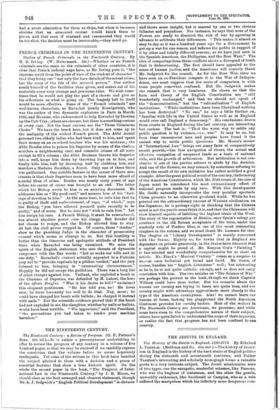THE NINETEENTH CENTURY.
The Nineteenth Century : a Review of Progress. (G. P. Putnam's Sons. 10s. 6d.)—It is rather a presumptuous undertaking to offer to review the progress of any century in a volume of five hundred pages, so that we may be excused if we candidly express the conviction that the volume before us seems hopelessly inadequate. Yet some of the writers in this book have handled the subject allotted to them with a decision and a grasp of essential features that show a true historic spirit. On the whole the second paper in the book, "The Progress of Inter- national Law in the Nineteenth Century," by S. B. Moore, we should class as the best arranged and clearest statement, though Mr. A. J. Sedgwick's "English Political Development " is cleverer
and shows more insight, but is marred by one or two obvious fallacies and prejudices. For instance, he says that none of the Powers are ready to diminish the risk of war by agreeing in advance to arbitrate their differences. "This makes it almost as easy to-day as it was a hundred years ago for a Government to get up a war for one reason, and inflame the public in support of it by other and totally different reasons; as we have just seen in the Spanish-American, the Philippine, and the Boer Wars." The idea of comparing these three conflicts shows a disregard of truth that is disheartening. The first should have appealed to the sense of human justice, and the Americans will scarcely thank Mr. Sedgwick for the remark. As for the Boer War, since we have seen an ex-President compare it to the War of Indepen- dence, one must suppose that the sense of comparison is with some people somewhat confused. But Mr. Sedgwick makes one remark that is very luminous. He shows us that the form and theory of the English Constitution are "still wonderfully unchanged," and that we should not speak of the "democratisation," but the " rationalisation " of English institutions. "While institutions have been liberalised nothing has been destroyed." "No one," he says a little further on, "familiar with life in the United States as well as in England would ever call England a democracy." His conclusions, drawn from events in England during the last century, are interesting but curious. The last is : "That the worst way to settle any public question is by violence,—i.e., war." It may be so, but from time immemorial men and peoples have found it the easiest way to settle public questions. Mr. Moore's review of "International Law" brings out many facts of comparatively recent growth,—the free navigation of rivers, the actual and effective occupation of unopened lands as a basis of national title, and the growth of arbitration. But arbitration is not con- clusive if one of the parties refuses to abide by the decision. And one of the Powers, we may remark, by sometimes refusing to accept the result of its own initiative has rather nullified a good example. After the great political event of the century, the founding of the American Constitution, which Mr. Nott treats of, the rise of Japan must be considered the most extraordinary effort of national progress made by any race. With this development Mr. Griffis naturally incorporates the very peculiar spectacle China presents to an otherwise go-ahead world. While he has pointed out the extraordinary success of Western civilisation on the Japanese, he is perhaps right in thinking that the Chinese mind is not the puzzle some think it is, and that the Chinaman will show himself capable of imbibing the highest ideals of the West. The story of the regeneration of Mexico, once Spain's colony par excellence in the old Roman acceptance of the term, under the masterly rule of Porfirio Diaz, is one of the most interesting chapters in the volume, and we must thank Mr. Lummia for this- The chapter on "Library Development" is mainly concerned with the States. Rightly so, for towns that in England are dependant on private generosity, in the States have libraries that a capital might be proud of. Mr. Kenyon Cox' s "Painting" is fair-minded and wonderfully comprehensive for so short an article. Mr. Finck's "Musical Century" comes as a surprise to us,—at once technical yet broad and lucid. Mr. Gosse, of course, handles his "English Literature" well; but interesting as he is, he is not quite catholic enough, and so does not carry conviction with him. The two articles on "The Science of War" are perhaps the poorest in the book, though we think Captain Willcox could have done better. But his remarks about the lessons our cavalry are trying to learn are quite true, and our cavalry might with advantage approximate more closely to the type of the American cavalryman. Alas ! we cannot learn our lessons at home, lacking the playground the North American Continent provides for cavalry tactics. Most of the writers in The Nineteenth Century are Americans, we presume; and while some have risen to the comprehensive nature of their subject, others have quite failed to understand the scope of their inquiries, or realise the fact that progress has not been confined to one country.




















































 Previous page
Previous page